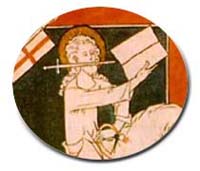Benedict XIV's Reasons for Condemning Freemasonry
In the mid 18th century rumors were circulating in French circles that the Pope was about to revoke Clement XII’s Bull In Eminenti Apostolatus against freemasonry. To squelch those rumors, Benedict XIV issued the Bull Providas Romanorum Pontificum in May 1751. It reiterated the wording of Clement XII's document in order to make it very evident that the condemnation of Freemasonry was irrevocable and was to be applied to the future as well as to the present.
Below is an excerpt of Providas Romanum Pontificum.
Benedict XIV
In order to prevent anyone from saying that We have imprudently omitted anything to swiftly eradicate the pretext of deceitful calumnies and silence them, after heeding the counsel of some of Our Brother Cardinals of the Holy Roman Church, We confirm the same Constitution of Our Predecessor [In Eminenti Apostolatus], word for word, as set out above, which must be considered the broadest and more efficacious on the matter: In our full knowledge and in the plenitude of Our Apostolic authority We confirm it, validate it, renew it and desire and decree that it must have perpetual force and efficacy in all things, according to its content, as if it had been promulgated by Our motu proprio and with Our authority and had been published the first time by Us.
Truly, among the most grave reasons for the prohibitions and condemnations set forth in the mentioned Constitution, there is one whereby in such society [Freemasonry] and secret meetings men of all religions or sects can join together in close gatherings; it is clear that this can harm the purity of the Catholic Religion.
The second reason is the strict and impenetrable promise of secrecy, which forces one to hide what he does in those meetings, to which one can properly apply this saying of Cecilio Natale to Minucio Felice on a different topic: 'Honest things always love the public light; the evil ones are secret.'
The third reason is the secret oath by which one [a member of Freemasonry] commits to inviolably observe, in such a way that it is permited for him when questioned by a legitimate power, to use any excuse - be it a promise or an oath - to avoid the obligation of confessing everything asked of him in order to know whether anything in those secret meetings is done contrary to the stability and the laws of Religion and the Republic.
The fourth reason is that these Societies are opposed to both Civil and Canonic sanctions, taking into account that Civil Law prohibits gatherings and meetings without the permission of the public authority, as one reads in the Pandette (book 47, tit. 22, De Collegis et corposibus illicitis) and in the famous letter of C. Plinio Cecilio (n. 97 of book 10), who reports that it was forbidden by his edict, under the direct command of the Emperor, for Eterie to take place, that is, for societies and meetings to exist and gather without the authorization of the Emperor.
The fifth reason is that in many regions and cities, the mentioned societies and groups have already been proscribed and banned by laws of the secular Princes.
Finally, the last reason is that prudent and honest men have faulted the mentioned societies and groups: by their judgment anyone who becomes a member of them incurs a stigma of depravity and perversion.

(Benedict XIV, Bull Providas Romanorum Pontificum, May 1751
Posted on October 27, 2012


Related Topics of Interest
 Clement XII: Perpetual Condemnation of Masonry Clement XII: Perpetual Condemnation of Masonry
 Leo XIII Describes & Condemns Freemasonry Leo XIII Describes & Condemns Freemasonry
 The Catholic Church and Freemasonry The Catholic Church and Freemasonry
 John XXIII Death Mourned by Freemasonry John XXIII Death Mourned by Freemasonry
 Pope Wojtyla Rewarded by Freemasonry Pope Wojtyla Rewarded by Freemasonry
 Leo XIII: Let No Man Join the Masonic Sect Leo XIII: Let No Man Join the Masonic Sect
 Bishop Receives Masonic Honors Bishop Receives Masonic Honors
 American Monsignor Decorated by B'nai B'rith American Monsignor Decorated by B'nai B'rith
 Masons at a Brazilian Cathedral Masons at a Brazilian Cathedral
 Maximilian Kolbe to the Masons: The Jews Control You Maximilian Kolbe to the Masons: The Jews Control You

Related Works of Interest
|
|